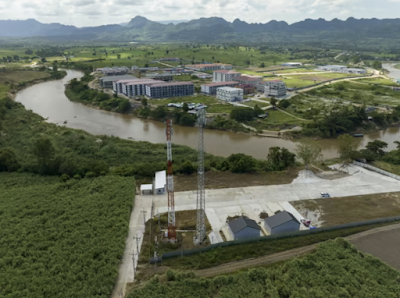Monday, August 21, 2023
From Shwe Kokko to KK Park: anarcho-capitalism in action
Well, here’s a nightmare-fuel story if I ever saw one.
Since 2017, a bunch of ethnic militias along the Moei River between Thailand and Myanmar have entered into agreements with the Burmese military, which allow them full autonomy within certain ‘special economic zones’ in the area. At the same time, casino owners and hei shehui (Triad) leaders in Macau, fleeing a Chinese government crackdown, quite literally set up shop in the area. The most notorious of these, She Zhijiang, has been on the run from the Chinese authorities since 2012. Completely outside the reach of any law—whether Thai, or Burmese, or Chinese—a veritable bevy of shady casinos popped up along this stretch of river, with bribes to local officials providing blind eyes to construction outside of government-approved areas, and security being provided by paid members of Karen ethnic militias, apparently including both anti-government groups such as the Karen National Union and pro-government ones such as the Border Guard Forces.
It’s proven to be a match made in hell. The modus operandi of these casinos, which are in reality ‘fraud factories’ or ‘fraud parks’ (zhapian yuanqu 诈骗园区) is to lure migrants in with promises of easy work and high pay. Once the migrants are there, the bosses confiscate their phones and passports, put them into barracks-like living conditions, and force them to work on the casino floors or in scam call centres. Electrocutions, beatings and sensory deprivation are common punishments. New ‘recruits’ are often first pressured to extort their own families for money. If they have technological skills, they are put to work designing online fraud systems. If they do not perform adequately, the women are forced into prostitution and the men are sent into forced labour. If they fall foul of the overseers at that point, they are shipped off to seasteads, killed and dissected for their organs: kidneys, hearts and eyes being in the highest demand.
In general, the prime targets for this victimisation are people who can speak Mandarin and Cantonese: people from Mainland China, Hong Kong and Taiwan. But the bosses of these ‘fraud parks’ aren’t exactly picky. Indonesians have been targeted as slave labour for these casinos. So have Burmese people themselves, as well as Filipinos, Laotians, Hmong, Vietnamese, Nepalis, Thais, Malaysians and Kenyans. According to news.sina.cn, at the very least 20,000 people are being held in such conditions at Shwe Kokko and KK Park.
‘Special economic zones’. No law enforcement except for-profit militias. Unregulated casinos. Cryptocurrency farming. Seasteading. Markets in human organs. What with all of this no-holds-barred profiteering going on, Shwe Kokko, Myawaddy and KK Park sound like Austrian School, anarcho-capitalist wet dreams. The rise of the slavery-driven ‘fraud park’ in this lawless region should be a cautionary tale to anyone who might think the anarcho-capitalist ideology is in any way feasible or desirable from a humanitarian perspective. But there’s far more to it than that.
The question remains: why would all these shady casinos choose to set up shop in the literal boondocks of Southeast Asia in the wake of COVID? For some, it seems, the answer seems obvious. That’s where the Belt and Road Initiative money was going; therefore China is to blame for these parks’ existence in the first place. But that explanation—really more like an excuse—doesn’t stand up to scrutiny. She Zhijiang has been a wanted criminal since 2012. It seems a stretch, to say the least, that the Chinese government would willingly just give him or his organisation money to fund these developments.
It looks rather like these ‘new’ developments are instead being built on rather well-trodden ground, at least as far as black-market activity goes. Back in 2000, long before the Belt and Road Initiative was a thing, let alone COVID or the political crisis in Myanmar or the crackdown on online gambling in Macau, the Thai side of that same Moei River was being used as a hub for shady casino constructions and drug smuggling, particularly opium. Evidently today that trade is again seeing a boom, and it would be neither unprecedented nor out of character for these ‘fraud parks’ to be coexisting with if not actively facilitating trade in both farmed and synthetic opiates.
What this seems to indicate is that the Belt and Road Initiative is attracting a dark, parasitic side which operates outside of any national law, in grey zones where political instability and illicit economic opportunity overlap. These non-state actors, rather than any state agency, pose the greatest threat to human dignity, as they are bound to no law and have no legitimacy other than that of brute violence. For the safety of the region and its people, the political crisis in Myanmar should be resolved swiftly and with a minimum of further bloodshed; as should the political crisis in Thailand.
Subscribe to:
Post Comments (Atom)


No comments:
Post a Comment